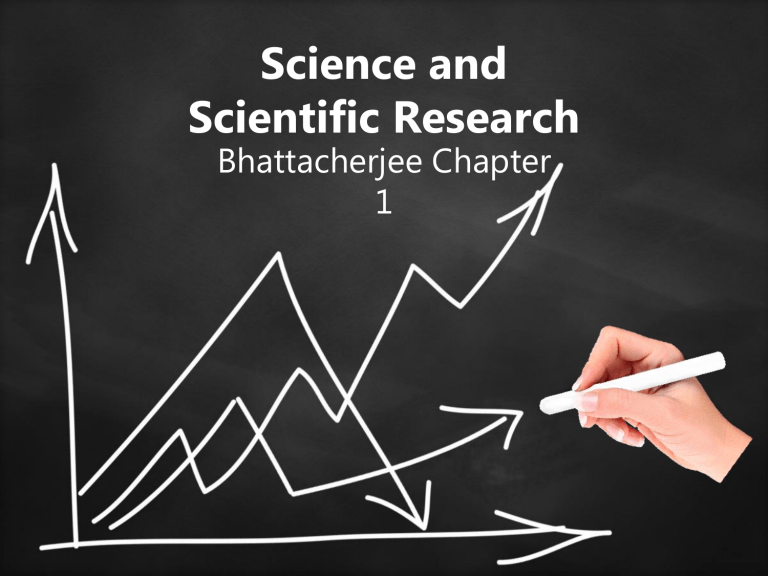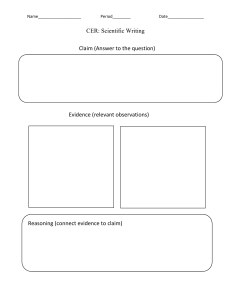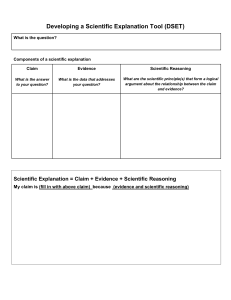
Science and Scientific Research Bhattacherjee Chapter 1 What is Research? • Why don’t people like research? – Tend to assume it is boring & hard to understand • What is research? – Does google count? – Defined by Merriam-Webster as (noun): • Careful or diligent search • Studious inquiry or examination • The collecting of information about a particular subject What is Research? • Defined by Merriam-Webster as (verb): • To search or investigate exhaustively • To do research for • Based on these definitions, how often do you engage in research during a typical week? Research • Research is everywhere & we engage in it all the time – Primary Examples: How Does Scientific Research Differ? • To be “scientific,” research must: – Contribute to a body of science – Follow the scientific method – Science historically defined as knowledge • Today, considered a systematic & organized body of knowledge in any area of inquiry that is acquired using “the scientific method” Science • Two broad categories: – Natural science – earth science, chemistry, biology, physics, etc. – Social science – psychology, sociology, economics, CJ, etc. • Social science research is more challenging – concepts are harder to measure! – Example: How do you measure a person’s happiness? – Findings produced are also more difficult to interpret Social Science Research • Why bother? – Well planned and executed research produces verifiable facts and reliable knowledge Some Definitions • Scientific knowledge – generalized body of laws & theories to explain a phenomenon or behavior acquired via scientific method • Laws – observed patterns of phenomena or behaviors • Theories – systematic explanations of underlying phenomenon or behavior • Evidence - observations Scientific Research • Two pillars of science: • Theory • Observations • Two levels of scientific research: • Theoretical level – developing abstract concepts & relationships between concepts • Empirical level – testing theoretical concepts & relationships to see how well they reflect observations (evidence) Methods of Reasoning • Determined by where the researcher begins the inquiry • Two common methods of reasoning: – Deduction or deductive reasoning begins with a theory & collects data to either support or falsify the theory – Induction or inductive reasoning begins with data (or observations) & seeks to develop a theory to explain behavior Methods of Reasoning Scientific Method • Refers to a standardized set of techniques used to build scientific knowledge • Must satisfy four key characteristics: – – – – Logical Confirmable Repeatable Scrutinizable Where is Research Found? • Academic & scholarly journals • Research monographs • Textbooks • Newspapers & magazines • Trade publications • Corporate research reports • Legislative actions/policy • Databases Peer Review • Articles submitted for publication are reviewed by experts in the field • Intended to ensure quality research is published • Enhances the overall caliber of research Types of Scientific Research 1. Exploratory research: to learn about social trends and phenomena that we know very little about 2. Descriptive research: describes social trends and phenomena 3. Explanatory research: attempts to explain causes for social trends and phenomena Research Paradigms • Paradigm – general organizing framework for theory & empirical research • Three common paradigms: 1. Positivist – relies on empirical observations & attempts to establish causation between variables 2. Interpretive – attempts to measure human behavior by understanding its meaning 3. Critical – assumes research is not value free & every researcher brings some bias into the process Why is Research Important? • Research is the foundation upon which the body of knowledge on a topic is expanded • Research is important when we want to: – Respond to social problems – Allocate limited resources wisely – Base decisions on evidence rather than ideology

